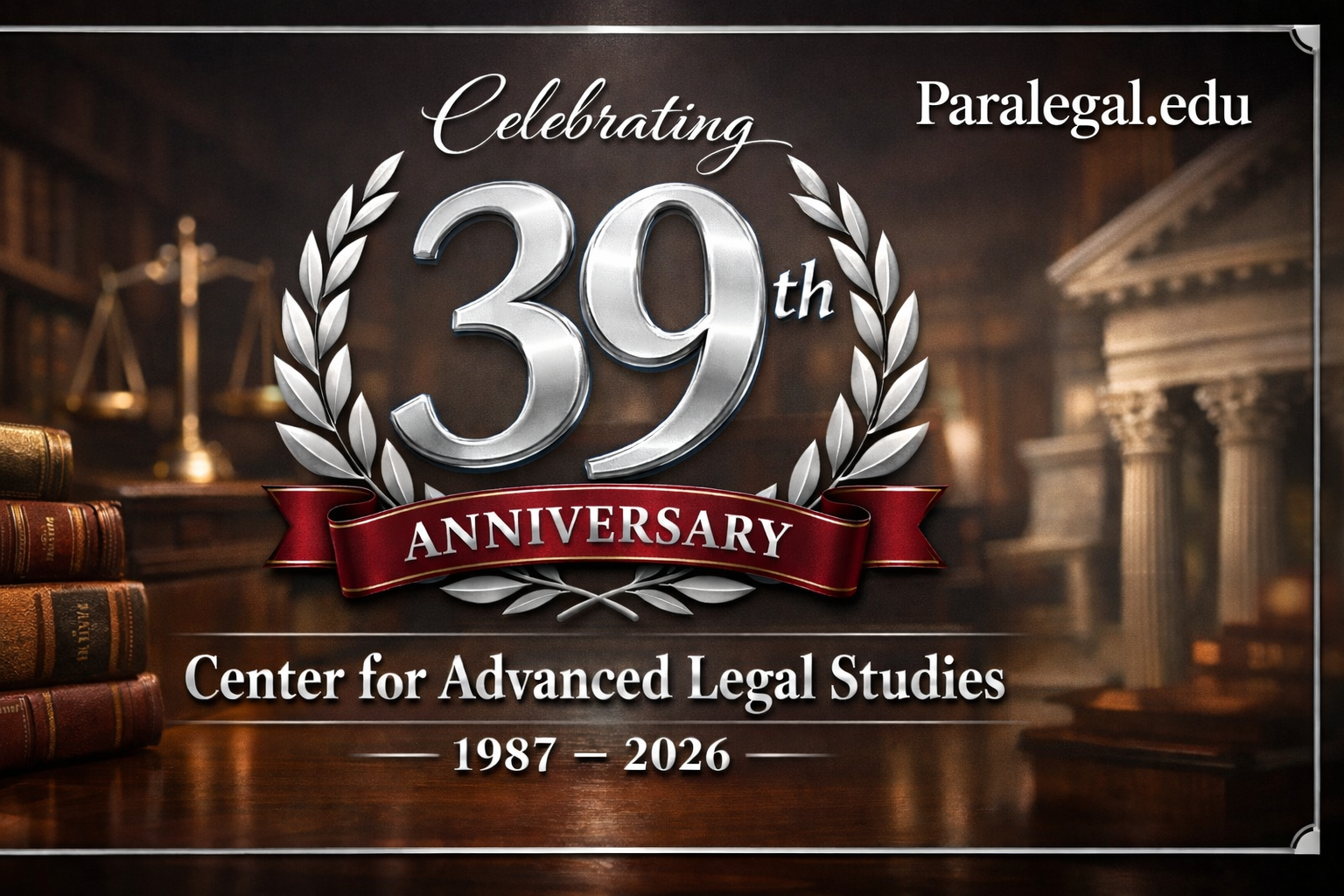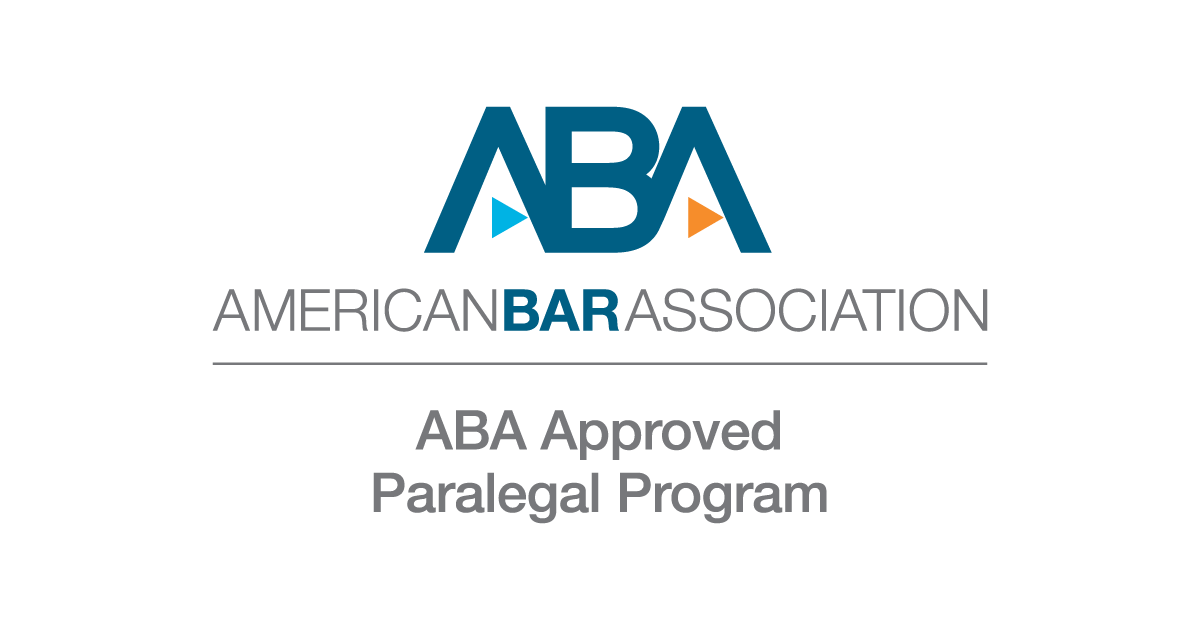As a paralegal, you will work with attorneys who value higher education and have devoted a significant amount of time and expense to pursue a legal career. Your paralegal education will matter to them.When considering where to receive your paralegal education, ask yourself: Is the program comprehensive enough to give you the skills, knowledge, and confidence you need to work alongside an attorney?
One way to make certain is to evaluate the program length to ensure adequate attention is paid to critical subject areas. Further, recognized authorities in paralegal education have established minimum standards regarding program length. The State of California requires “the successful completion of a minimum of 24 semester, or equivalent, units in law-related courses and that has been accredited by a national or regional accrediting organization”[1] as one criterion for a person to call themselves a paralegal.
The American Bar Association recommends that paralegal programs contain at least 18 semester hour credits of legal specialty courses in addition to 18 semester hours or more of academic general education courses. Their recommended total program length amounts to 60 semester hours or more.[2] For most, this means the completion of an Associate of Applied Science Degree in Paralegal Studies, or the completion of a Paralegal Certificate program after previously earning a college degree of two years or higher.
These recommendations are consistent with the Bureau of Labor Statistics (BLS) which states the typical entry-level education requirement is “an associate degree in paralegal studies from a postsecondary institution.” The BLS continues to emphasize that “many employers may prefer, or even require, applicants to have a bachelor’s degree”, and “because only a small number of schools offer bachelor’s degrees in paralegal studies, applicants will typically have a bachelor’s degree in another subject and earn a certificate in paralegal studies.”[3]
Consequently, “your choice of a paralegal program will have a profound impact on your opportunities for success in the career. Since there is a wide range in the quality of programs, choose carefully. Give yourself the best possible chance to succeed in this exciting profession.”[4]
“Paralegal education programs are offered in many formats and lengths. Various kinds of public and private institutions offer paralegal education, including community colleges, four-year colleges and universities, business colleges and proprietary institutions. These various institutions make it possible for persons with diverse backgrounds to enter the profession.”[5]
The most common program types and lengths are:
Associate Degree Programs: ≈ 60 semester hours
Baccalaureate Degree Programs: ≈ 120 semester hours
Certificate Programs: varies in length considerably
Master’s Degree Programs: ≈ 30-36 graduate semester hours
Any of the degree program types listed above are likely to contain at least the minimum recommended 24 semester hours of law-related courses. Most degree programs are also accredited, and as such have met standards for quality. Another advantage of accredited institutions is their ability to provide students with the opportunity to participate in Federal Student Aid in the form of student loans and grants. “Financially, students that use the services of unaccredited colleges waive any federal or state financial aid, and in some cases are also exempt from receiving certain scholarships and grants.”[6]
Paralegal certificate programs can vary tremendously in their length, scope and rigor. Some certificate programs are accredited and are more likely to contain the recommended 24 semester hours of law-related courses. It is probable that these programs adhere to standards of high quality and are of significant rigor to prepare one to enter the paralegal profession with confidence.
Unfortunately, some programs claim that a person can obtain the required education and training in a matter of a few weeks or months. This is clearly untrue, and these institutions prey on a person’s desire to obtain a paralegal certificate quickly without having to devote much time or incur much expense.
This has become such a problem that the American Association for Paralegal Education published a position statement decrying these practices.
In recent years there has been a proliferation of short-term entry-level paralegal training programs of very limited duration, some with as few as 125 clock hours (which is less than nine semester credit hours). These programs do a fundamental disservice to the legal profession by creating unrealistic expectations in both employers and students that a quality paralegal education has been delivered when such may not be the case. AAfPE opposes the proliferation of these short-term paralegal programs because these programs do not meet minimal standards recognized by virtually all paralegal educators, lawyers and paralegals. These programs undermine the legitimate educational efforts of AAfPE institutions that seek to provide quality entry-level paralegal education. These short-term programs are doing a disservice to the students who enroll in them, to those who employ paralegals, and to the legal profession.[7]
 Surprisingly, many of these non-accredited short-term programs are housed at notable colleges and universities, often within their continuing education departments. Students may feel they are attending these prestigious universities, when in fact they are taking non-credit courses often developed by a 3rd party vendor. Most of these programs operate without regulation or oversight and are regarded as profit centers for the college or university. Before enrolling, be sure to ask about their tuition refund policies, their graduation and employment rates, and what governmental or educational oversight measures are in place to ensure the quality and effectiveness of the program. If the answers don’t measure up to your expectations, rest assured you have many options available to pursue your paralegal education at other institutions.
Surprisingly, many of these non-accredited short-term programs are housed at notable colleges and universities, often within their continuing education departments. Students may feel they are attending these prestigious universities, when in fact they are taking non-credit courses often developed by a 3rd party vendor. Most of these programs operate without regulation or oversight and are regarded as profit centers for the college or university. Before enrolling, be sure to ask about their tuition refund policies, their graduation and employment rates, and what governmental or educational oversight measures are in place to ensure the quality and effectiveness of the program. If the answers don’t measure up to your expectations, rest assured you have many options available to pursue your paralegal education at other institutions.
The decision on which paralegal program to attend is an important one. Careful research and planning are essential. Choosing a paralegal program that is accredited and contains at least 24 semester hours of law specialty courses is a great place to start. Don’t sell yourself short on the length of your paralegal program. Your education is an important investment in your future.
Note: This article first appeared in the April 2019 Paralegals Connect Newsletter. To read other articles regarding the paralegal profession, or to join Paralegals Connect, please visit http://www.paralegalsconnect.com/ or on Facebook at https://www.facebook.com/groups/ParalegalsConnect/
[1] California Business and Professions Code 6450(c)(2)
[2] American Bar Association Standing Committee on Paralegals, “ABA Guidelines for the Approval of Paralegal Education Programs”, on the Internet at https://www.americanbar.org/content/dam/aba/administrative/paralegals/ls_prlgs_2018_paralegal_guidelines.pdf
[3] Bureau of Labor Statistics, U.S. Department of Labor, Occupational Outlook Handbook, Paralegals and Legal Assistants, on the Internet at https://www.bls.gov/ooh/legal/paralegals-and-legal-assistants.htm (visited March 24, 2019).
[4] American Association for Paralegal Education, “Choosing a paralegal program”, on the Internet at https://www.aafpe.org/page/ParalegalProgram (March 27, 2019)
[5] ibid
[6] National Consumer Advocacy Commission, “Counterfeit Degrees – Fighting the Billion Dollar Scam: Taking a Non-Accredited Course”, on the Internet at http://www.counterfeitdegrees.com/accreditation/non.htm (March 27, 2019)
[7] American Association for Paralegal Education, “Policy Statement Regarding Short-Term Programs”, on the Internet at http://www.aafpe.org/About_AAfPE/files/Short-Term_Statement.pdf (March 27, 2019)

Director
Eric received his Paralegal Certificate from Center for Advanced Legal Studies (CALS) in 1988 and worked as a paralegal in Houston, Texas, for six years. Eric returned to CALS in 1996 and has served in numerous roles. Eric helped migrate traditional paralegal classes and programs online and, more recently, developed the Bachelor of Arts: Law and Business program.






